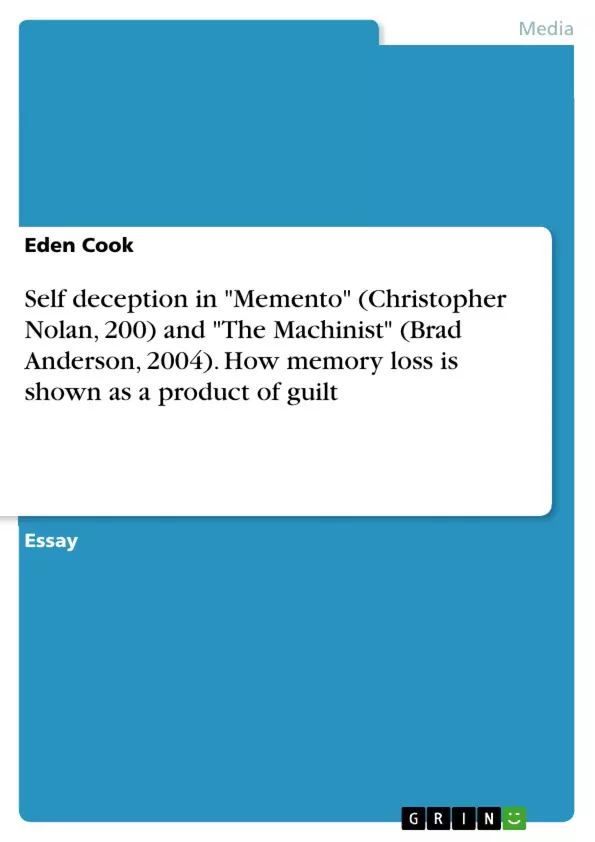Throughout this essay I explore the ways in which the memory loss of Trevor Reznik and Leonard Shelby can be seen as a symptom of guilt. Whilst it may be drawn that Trevor’s mental health is impacted by his insomnia, and Leonard’s condition is explained by the accident, the complex narratives allow various readings, through which it can be speculated that the tormented mental states of both men results in a process of self deception, of which memory loss is a key element. Throughout the films there are various “clues” in the form of flashbacks, formative techniques, and the doubling of personality which suggests their guilty conscience plays a prominent role in their amnesia. Whilst the protagonists’ lives are controlled by their inability to remember, their memory loss can be seen as a coping mechanism to shield traumatic events of their personal history from their current selves. In all, I discuss how the abnormal mental states of the protagonists can be seen as a result of psychological trauma and a guilty conscience, through which their subsequent memory loss is used in a process of deception.
Inhaltsverzeichnis (Table of Contents)
- Self deception in Memento (Christopher Nolan, 2000) and The Machinist (Brad Anderson, 2004): how memory loss is shown as a product of guilt.
- Leonard Shelby and Sammy
- Trevor Reznik and Ivan
- The Use of Projection
- The Reliability of Leonard's Condition
Zielsetzung und Themenschwerpunkte (Objectives and Key Themes)
This essay analyzes the films Memento (Christopher Nolan, 2000) and The Machinist (Brad Anderson, 2004) to explore how the characters' memory loss can be interpreted as a symptom of guilt. The complex narratives allow for various readings, suggesting that the protagonists' tormented mental states result in self-deception, of which memory loss is a central element. The essay examines how the protagonists' inability to remember can be understood as a coping mechanism to shield traumatic events from their consciousness. Ultimately, the paper explores how their abnormal mental states arise from psychological trauma and a guilty conscience, leading to their use of memory loss as a means of deception.
- Memory Loss as a Product of Guilt
- Self-Deception and the Creation of Alter Egos
- Psychological Trauma and the Role of Projection
- The Reliability of Memory and the Effects of PTSD
- Formative Techniques and the Blurring of Identity
Zusammenfassung der Kapitel (Chapter Summaries)
- The essay introduces the main argument, which is that the memory loss of Leonard Shelby (Memento) and Trevor Reznik (The Machinist) can be seen as a symptom of guilt. It proposes that their inability to remember serves as a coping mechanism to shield them from traumatic events.
- This section focuses on Leonard Shelby and his alter ego, Sammy. It examines how Leonard's creation of Sammy can be interpreted as a process of self-deception, where he transfers his most serious wrongdoing onto Sammy to mask his guilt.
- This section explores the relationship between Trevor Reznik and his alter ego, Ivan. It analyzes how Ivan's hounding and tormenting of Trevor act as a form of self-punishment and correction for Trevor's past actions.
- This section examines the concept of projection as a key mechanism for self-deception in both films. It explores how the protagonists' externalize their most serious wrongdoings onto their alter egos, effectively masking their true identities.
- This section delves into the reliability of Leonard's condition and explores the possibility that he may be suffering from PTSD. It examines how the psychological effects of trauma can influence memory alterations and potentially explain his ability to remember certain details despite his amnesia.
Schlüsselwörter (Keywords)
The essay explores key themes such as memory loss, guilt, self-deception, psychological trauma, projection, and PTSD. It examines how these concepts are intertwined and manifest in the narratives of Memento and The Machinist.
Frequently Asked Questions
How is memory loss linked to guilt in "Memento" and "The Machinist"?
The essay argues that the protagonists' amnesia serves as a coping mechanism to shield themselves from traumatic events and a guilty conscience.
Who are Leonard Shelby and Sammy in "Memento"?
Leonard creates the story of Sammy as a form of self-deception, projecting his own actions and guilt onto another person to mask his true identity.
What is the role of Ivan in "The Machinist"?
Ivan is an alter ego and a projection of Trevor's guilt, hounding him as a form of psychological self-punishment for his past actions.
Can memory loss be a form of self-deception?
Yes, the films suggest that the mind can intentionally "lose" memories to protect the self from unbearable psychological trauma and guilt.
How does PTSD relate to Leonard's condition in "Memento"?
The essay explores whether Leonard's inability to remember is strictly physical or if it is influenced by the psychological effects of PTSD and trauma.
- Quote paper
- Eden Cook (Author), 2017, Self deception in "Memento" (Christopher Nolan, 200) and "The Machinist" (Brad Anderson, 2004). How memory loss is shown as a product of guilt, Munich, GRIN Verlag, https://www.grin.com/document/371751



